Ex-post analysis of energy demand 2021
As a continuation of the ex-post analysis 2019 and 2020, Prognos, Infras and TEP Energy are examining the uses of domestic energy for the years 2000 – 2021 in the 2021 ex-post analysis. For this, a bottom-up model is used, taking into account weather conditions, economic growth, population development, production volumes, energy reference areas, energy prices, technical progress and political measures over the years.
Project Duration2022
Contact at TEP EnergyMartin Jakob, Giacomo Catenazzi
Contracting PartySwiss Federal Office of Energy
Project PartnersPrognos (Lead), TEP Energy, Infras
Project WebsiteExpost Analysis; SFOE Website
Final Report (German)PDF
Reference projects
- Ex-Post Analysis of Energy Demand in the Swiss Service Sector
- Ex-Post Analysis of Energy Demand 2019
- Ex-Post Analysis of Energy Demand 2018

Energy renovation rates in the building sector
Various federal and cantonal energy and climate policy measures are aimed at significantly increasing the energy renovation rate. Based on this comprehensive survey, the report shows how the energy renovation rate has developed in recent years and how high it currently is.

Solar strategy Wädenswil
TEP Energy is conducting a solar strategy and potential study to accelerate the expansion of solar energy in the city of Wädenswil.

Energy Policy Simulator
TEP Energy is supporting the San Francisco based think tank Energy Innovation in the expansion of its Energy Policy Simulator (EPS).

SURE - SUstainable and REsilient energy for Switzerland
Sweet - SURE analyses the impact of disruptive events on the Swiss energy system. TEP Energy is working on energy demand topics such as the development of demand for energy sources in Switzerland, the impact of shocks on the demand load and the potential use of large heat pumps.

Net-zero greenhouse gas emissions in the building sector | TEP Energy
The aim of the project is to develop a common definition of "net zero greenhouse gas emissions in the building sector" for Switzerland that is accepted by all stakeholders and can be used as a basis for setting limits and targets.

MEDIUS
MEDIUS bridges the gap between green finance and green projects to decarbonize buildings at scale.

Criteria for Climate-Compatible Building Financing in Switzerland
TEP Energy and Raffeisen Schweiz show clear criteria on how to invest in climate-friendly buildings.

Data centers in Switzerland - Electricity consumption and efficiency potential
Due to a substantial and increasing amount of electricity consumption by servers rooms/data cetners in Switzerland, it is important to analyse the electricity demand and energy efficiency potentials.

Calculation Tool for 2000-Watt Sites II
Revised calculation tool for the evaluation of settlement areas regarding indicators of the 2000-watt society.

Country-specific Market Reports for Buildings
Building Market Briefs (BMB) is a Climate KIC initiative within the flagship Building Technologies Accelerator (BTA) that aims to gather and promote knowledge about the buildings' and construction sector to promote low carbon investment and scaling.

Swiss Energy Perspectives 2050+
To update the SFOE's energy perspectives, we are preparing the scenario results for the services and agricultural sector.

IEA ECB Annex 70: Analysis of Building Energy Data with a Scalable Building Stock Model
Relationship between building park modelling and real building and energy data.

Cantonal energy indicators and CO2 emissions in the building sector
In the context of the CO2 reporting, TEP Energy is developing a methodology for quantifying cantonal energy indicators and CO2 emissions from the building sector.
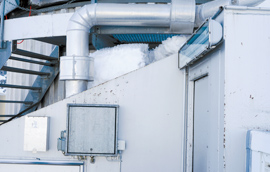
Ex-Post Analysis of Energy Demand in the Swiss Service Sector
Together with Prognos and Infras, we periodically carry out ex-post analyses of the energy demand in Switzerland on behalf of the Swiss Federal Office of Energy (SFOE). TEP Energy is responsible for the sectors services and agriculture.

PUEDA+: Promotion of energy efficiency in data centers and server rooms
Program to promote energy efficiency in the Swiss IT industry

Evaluation of measures using impact and cost analysis within the "Solar Strategy” project
Review of the expansion path of solar energy in the cantons of Aargau and Zurich

From the Certificate to Physics
Ways to net zero compatible buildings in the city of Zurich

New Trends in Energy Demand Modelling
In this Horizon2020 project, the impact of new societal trends on the energy consumption are modelled and analysed.

Energy certificate data to characterise the building stock
Gaining knowledge about the energetic quality of the German building stock from energy performance certificates

Reference Values of Cooling Systems in Buildings
Compilation of cooling reference values and improvement of the data basis to have a better support for strategic building planning

Energy Law Report for the Canton of Basel-Landschaft
Development of a methodology for the periodic evaluation of the measures and goals of the canton's energy law.

Funding Programme SOKAS: System Optimisation of Industrial Refrigerating Plants
The subsidy programme SOKAS supports the sustainable system-wide energy optimisation of large cooling and refrigeration plants. In addition to lower energy costs, system operators benefit from an attractive subsidy of up to 40% of the total project costs.

REFLEX Project: Flexibility and Technological Development in the European Energy System
REFLEX focuses on techno-economic learning, fundamental energy system modelling and social and environmental life cycle analysis.
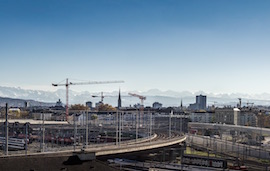
Heating Initiative Switzerland
On behalf of the Swiss Heating Initiative (WIS), the decarbonization of the heating sector will be examined by 2050. Spatial potential analyzes and the Swiss building stock model (GPM) are used.

Heat Roadmap Europe (HRE) – Study on the European Heating and Cooling Market
In Europe, the energy system is to be decarbonised in the long term, i.e. no more CO2 emissions will be emitted. We estimate energy efficiencies cost potential curves for 14 European countries.
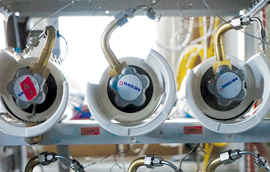
The Role of Gas Infrastructure in the Future Energy System
Energy policy decisions and technological developments lead to an increase in fluctuating renewable energy production. More flexibility in the power grid and storage possibilities is required to which the buildings' sector may contribute.

EEG Platform: Efficiency and Renewable Energy in Buildings (EEG)
Through the EEG platform, the developed actions from the EEG Action Plan can be jointly further developed and implemented throughout Switzerland.

CoolCity
Assessment of the potential for lake water use for heating and cooling in the city of Zurich

EEG Workshop: Energy Efficiency and Renewable Energies in Buildings (EEG)
The EEG Workshop on Energy Efficiency and Renewable Energy in Buildings (EEG) is part of the global programme "Energy Efficiency and Building Technology Accelerator" (EEB) of the World Business Council for Sustainable Development (WBCSD) and Climate-KIC.
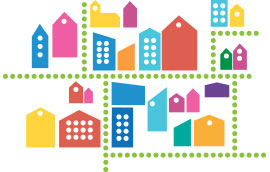
CREAM – Integrating Climate Change Mitigation, Resource Efficiency and Adaptation in Building Stock Modelling
Objectives, strategies and measures in the field of climate protection, energy planning and the further development of energy networks in cities are designed using the Building Park Model (GPM) in a cross-sectoral manner.

Definition and monitoring of security of supply on the European electricity markets from 2017 to 2019
Within the framework of the project, existing concepts of supply security on the European electricity market are to be analysed and monitoring concepts based on them are to be further developed.

Study on the Subsidiary Ban of Fossil-Fuelled Heating Systems
Swiss climate policy is facing major challenges, especially in the buildings sector. The study investigated the effects of a possible ban on fossil-fuelled heating systems from 2030, if the climate targets cannot otherwise be achieved.

Energy-Saving Contracting
Increasing energy efficiency is one of the central pillars of Swiss energy policy and energy-saving contracting contributes to this goal.

INSPIRE Tool: Energetic, Ecological and Economic Renovation of Buildings
With the INSPIRE tool you can calculate energy, ecological and economic indicators as well as strategies for the reduction of greenhouse gas emissions (GHG) and primary energy consumption of buildings.

Mapping and Analyses of the Current and Future (2020-2030) Heating/Cooling Fuel Deployment (Fossil Fuels/Renewables) in Europe
The energy balances of statistical offices in many countries and Eurostat are often incomplete. This EU service contract maps current and future energy demand for heating and cooling.

Instruments for Implementing Efficiency Measures in Building Technology
Which instruments support the implementation of efficiency measures in building services engineering as effectively and efficiently as possible?

Extension of the Building Stock Model for the SIA Efficiency Path
Using the enhanced building stock model, the primary energy and greenhouse gas emissions of new buildings and renovation projects are compared with the target values to review the impact of energy policy objectives.

Analysis of the State of Insulation Materials in the Swiss Building Stock
With regard to energy and resource policy, we must ask ourselves how we will deal with insulating materials in the future.

Energy Supply Concept 2050 for the City of Zurich
The Energy Supply Concept 2050 used a scenario approach to show that the heat supply of the city of Zurich could meet the goals of the 2000-watt society.

Potential Assessment of Measures in the Field of Building Technology
Where are what potentials to increase energy efficiency and to reduce greenhouse gas emissions (GHG) in building services engineering?

Analysis of Market Opportunities and Potentials in the Heating and Cooling Sector
Evaluation of new market opportunities on behalf of a large Swiss electricity supplier.
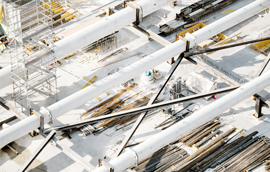
Integration of embodied Energy into the Building Stock Model (BSM)
By 2050, the City of Zurich intends to fully meet the goals of the 2000-watt society. Energy consumption in existing buildings and embodied energy are also part of this scope.

Contributions to the ewz Energy Research Programme on the 2000-watt Society
«Energy Research City of Zurich» is a 10-year programme for applied energy research.

Economic Analysis of Measures for the Energy Strategy 2050 – Efficiency Regulations for Electrical Appliances
With the Energy Strategy 2050, the Federal Council is pursuing the goal of significantly reducing electricity consumption in Switzerland by 2050 compared with a reference development.

Electricity Efficiency of the Swiss Economy – Evaluation and Scenarios of the EnAW
The impact of EnAW's previous activities in the field of electricity efficiency is statistically evaluated and the future development is bottom-up estimated.

Pilot Study: Building Stock Model (BSM) for Office, School and Residential Buildings
In collaboration with the ETH Chair for Sustainable Building, we developed a pilot version of the building stock model for Switzerland and for the city of Zurich.
